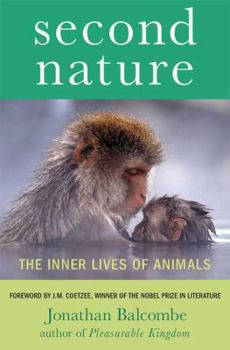Second Nature: The Inner Lives of Animals
Select Format
Select Condition 
Book Overview
For centuries we believed that humans were the only ones that mattered. The idea that animals had feelings was either dismissed or considered heresy. Today, that's all changing. New scientific studies of animal behavior reveal perceptions, intelligences, awareness and social skills that would have been deemed fantasy a generation ago. The implications make our troubled relationship to animals one of the most pressing moral issues of our time. Jonathan...
Format:Hardcover
Language:English
ISBN:0230613624
ISBN13:9780230613621
Release Date:March 2010
Publisher:Palgrave MacMillan
Length:242 Pages
Weight:0.99 lbs.
Dimensions:0.9" x 6.6" x 9.5"
Customer Reviews
3 ratings
For people who love animals
Published by Thriftbooks.com User , 14 years ago
This book is very well written and researched. For those of us who know that animals communicate with each other, and they attempt to communicate with people who can't understand, it is enlightening.
Great new book by Balcombe
Published by Thriftbooks.com User , 14 years ago
Second Nature, The Inner Lives of Animals, is a valuable addition to the growing body of literature about animal emotions. Following on the heels of previous books by Marc Bekoff, Jeffrey Masson and his own Pleasurable Kingdom, Balcombe makes a compelling case for a new, more humane human/animal paradigm. Throwing aside rigidity and close-mindedness, he approaches the subject with an open mind and an open heart. I wholeheartedly encourage anyone who is interested in animals to read this book. It will change the way you think. Rob Laidlaw CBiol MSB Director Zoocheck Canada Inc.
How do we know what animals are thinking?
Published by Thriftbooks.com User , 14 years ago
For most of the twentieth century, scientists avoided questions about how animals might feel and what they might think. They wanted to be viewed as objective in their study of animals and not use terms laden with human meaning. This led many to a view of non-human animals as being without emotions or thinking, and guided solely by reflex, instinct, and trial-and-error learning. But beginning with the work of pioneers such as Jane Goodall and Donald Griffin, scientists have discovered great surprises about how animals socialize, communicate, and think. As Jonathan Balcombe describes in his new book Second Nature: The Inner Lives of Animals, no longer is it viewed as heresy for researchers to examine such aspects as reason, culture, and even moral awareness in animals. His book documents that researchers around the world have found more thought and feeling in animals than humans have ever imagined. Second Nature gives us an understanding of the complex ways in which animals perceive and react with other animals and the environment. It starts out looking at animal senses, and shows how in many cases animals not only have sharper senses than we do, they often have full senses that we don't have. Birds can sense magnetism. Some fish can both make and sense electricity, and use it to perceive what is near them. Bats can make sounds far out of our hearing range, and use this to "see" flying insects similar to how we use light to see. What do these senses feel like to these animals? From here, Balcombe goes on to look at animal intelligence, and this is where the book begins to get really fun. There is a section looking at fish--animals that many people have prejudged to be lower animals, cold-blooded and machine-like. Some scientists have argued that fish cannot even feel pain, since they don't have the same brain structures we use to feel pain. But in the 400 million years or so since we last shared a common ancestor with most fish, fish brains did not stop evolving and adapting to a more complex and continually changing environment. In one of the more amusing studies that Balcombe describes, three carp were played recordings of Bach's classical music and also the blues of John Lee Hooker. All three fish learned to distinguish between the two musical genres and even could generalize from the specific artists to multiple artists within each genre. Following this are chapters on emotions, awareness, communications, sociability, and even morals and virtue--all examined from a scientific basis. Many of the examples are sure to amaze you. But for those more interested in the philosophy--what it all means--the last couple of chapters will be the most interesting. Quoting George Bernard Shaw that "custom will reconcile people to any atrocity," Balcombe looks at how we can be so caring and kind to animals in one part of our lives and then so cold, indifferent, and cruel under other circumstances. People might be very loving to their dogs or cats, but whe





